WORLD WILDLIFE DAY
South Africa’s war on wild animals
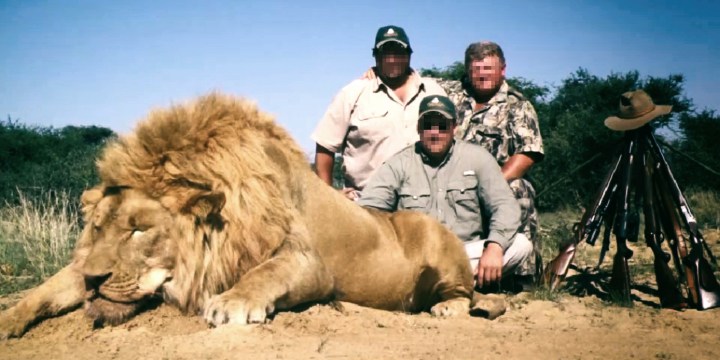
If you want to kill animals for fun, South Africa is the place. Topping the list of favourites by trophy hunters are lions, baboons, southern lechwes, caracals and vervet monkeys.
South Africa is one of the world’s greatest suppliers of wildlife trophies, many of them from captive-bred animals. The greatest number are shot by people from the US. From tigers to vervet monkeys, it’s all legal.
A report by the Humane Society International/Africa (HSI/Africa) — Trophy Hunting by the Numbers — quantifies a global industry dedicated to the “sport” of accumulating wild animal parts for bragging rights by largely non-African hunters. It was released to coincide with World Wildlife Day today (Thursday).
South Africa is listed as the world’s second-largest exporter of hunting trophies (after Canada), with most going to the US, followed by Spain, Russia and Denmark.
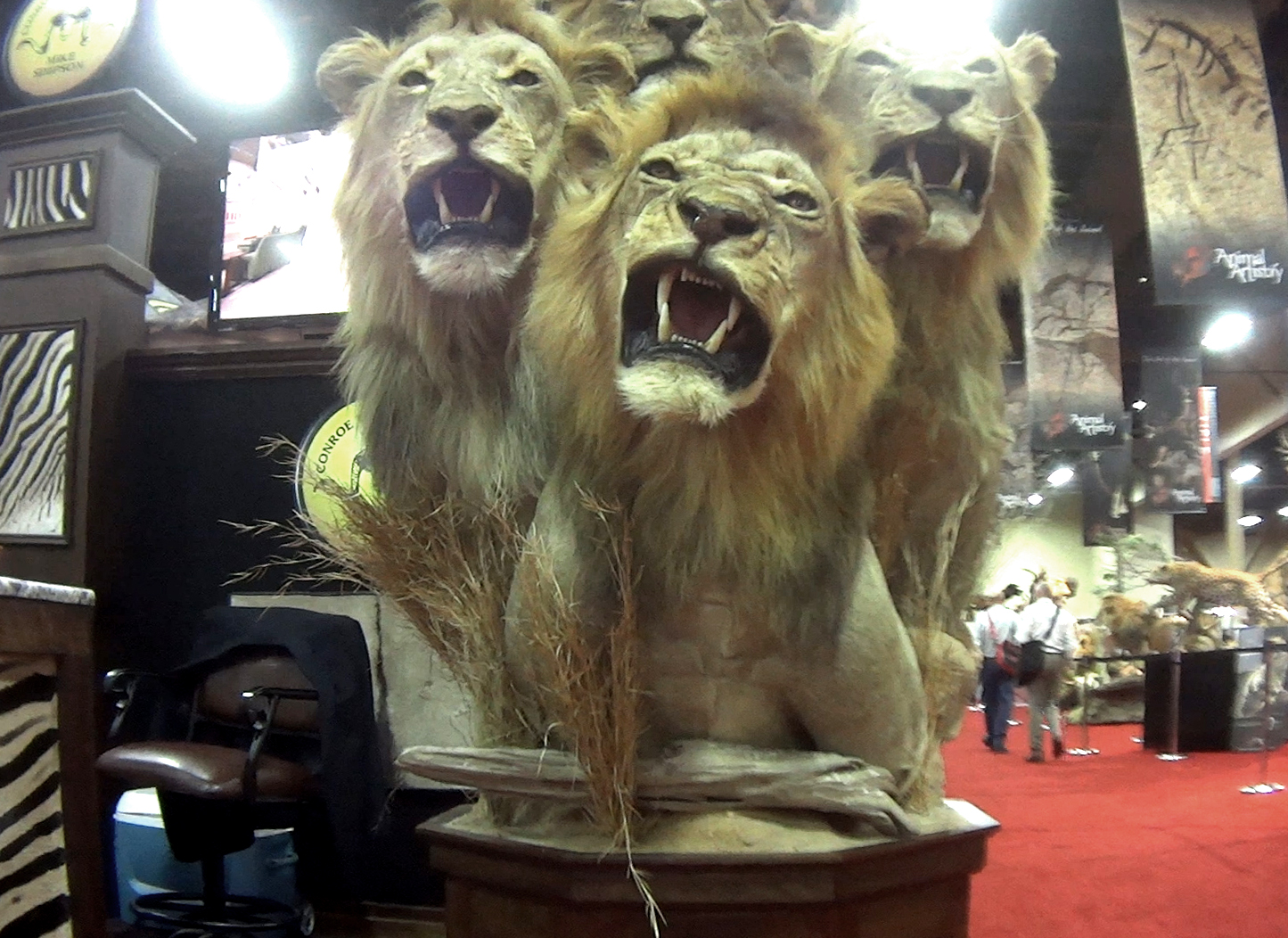
Video screen grabs from an undercover investigation at Safari Club International‘s annual hunters‘ convention in Las Vegas. (Photo: HSI / Africa)
The report is, as it says, about numbers and coincides with the latest hunting quotas for this year released by the Department of the Environment: 10 critically endangered black rhino, 150 endangered elephants — which will mostly be hunted in the Associated Private Nature Reserves and thus be from free-ranging Kruger Park herds — and 10 leopards, listed as vulnerable and with no known population estimates to back the allocation.
This is concerning news, says the report, especially on World Wildlife Day, which is intended to celebrate our collective natural heritage each year on 3 March and draw attention to the plight of threatened and endangered wild animals.
Between 2014 and 2018 (the latest complete data set from the UN trade organisation CITES), South Africa exported 21,018 trophies, an average of 4,204 a year. Of these, 4,176 were lion, 1,337 were elephant, 1,295 were hippo, 675 were rhino and 574 were leopard.
One in three trophy kills were of animals captive-bred for hunting, including most of the lions. However, nearly all elephants, rhinos and leopards hunted were wild-sourced.
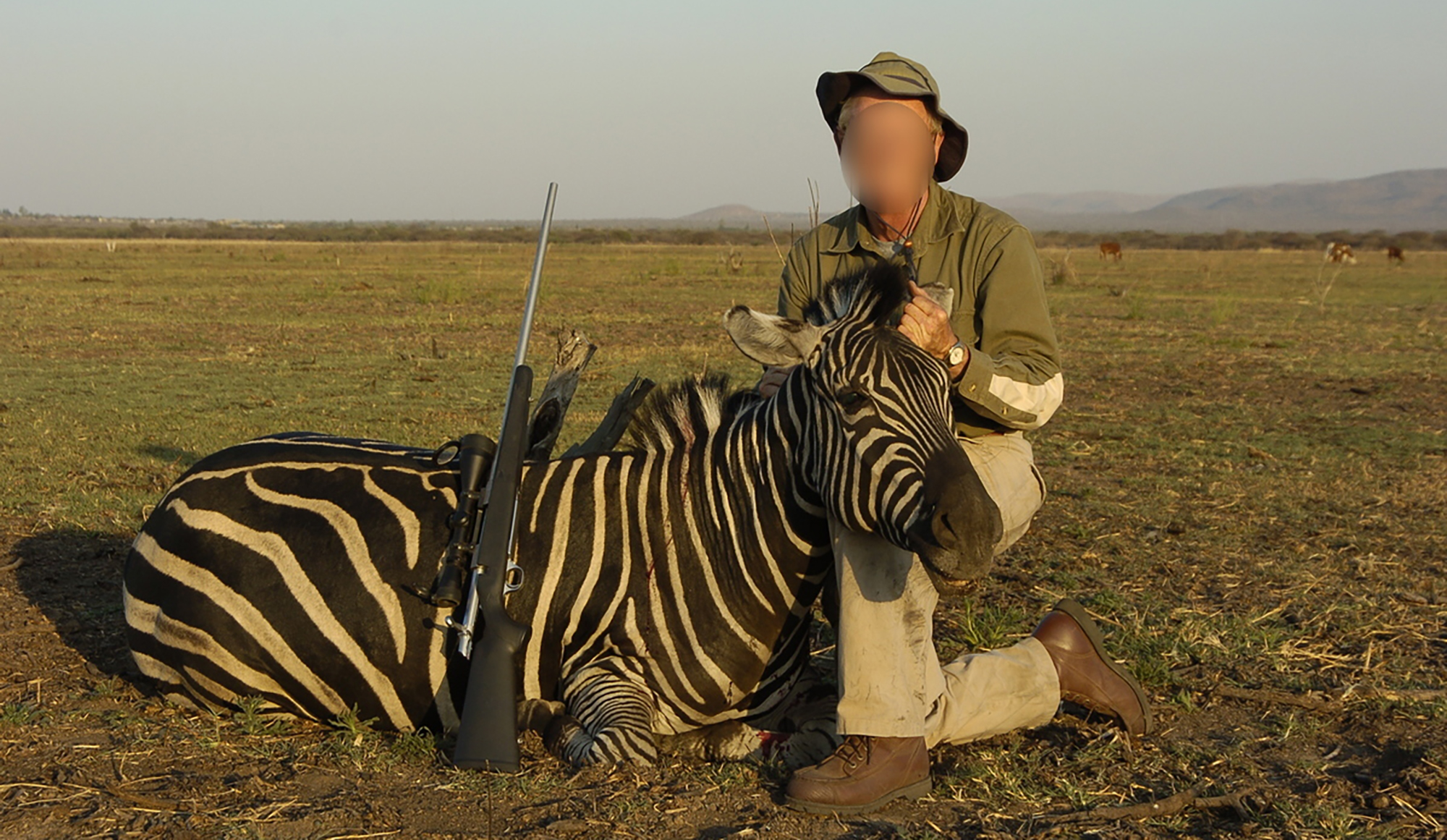
A hunter with his kill. (Photo: HSI / Africa)
Smaller species included 2,729 baboons, 2,422 southern lechwe, 1,693 caracals, 1,453 vervet monkeys, 496 civets, 410 blue duikers, 385 servals, 229 Barbary sheep, 250 honey badgers and a brown bear.
Critically endangered, endangered and vulnerable non-native species were also sourced and hunted in South Africa, including tigers, Indian hog deer, Arabian oryx and addax.
By far the largest importer of trophies was the US (54%), followed by Spain (5%), Russia (4%) and Denmark (3%). Other countries included Hungary, Mexico, China, Australia, Poland, Germany, the UK and France.
During the period, 2,227 trophies were imported to South Africa, mostly elephant, Hartmann’s mountain zebra, leopard and hippo, mainly from Namibia, Zimbabwe and Mozambique.
“The results of this study,” says the report, “demonstrate that South Africa is a major player in the international trophy hunting industry. This is something that the South Africa trophy hunting industry and the government of South Africa have promoted.
“[They] further proudly claim that trophy hunting contributes to conservation. The truth, as revealed in this study, is that trophy hunting as practised in South Africa is based on highly managed and manipulated animals as opposed to wild animals.
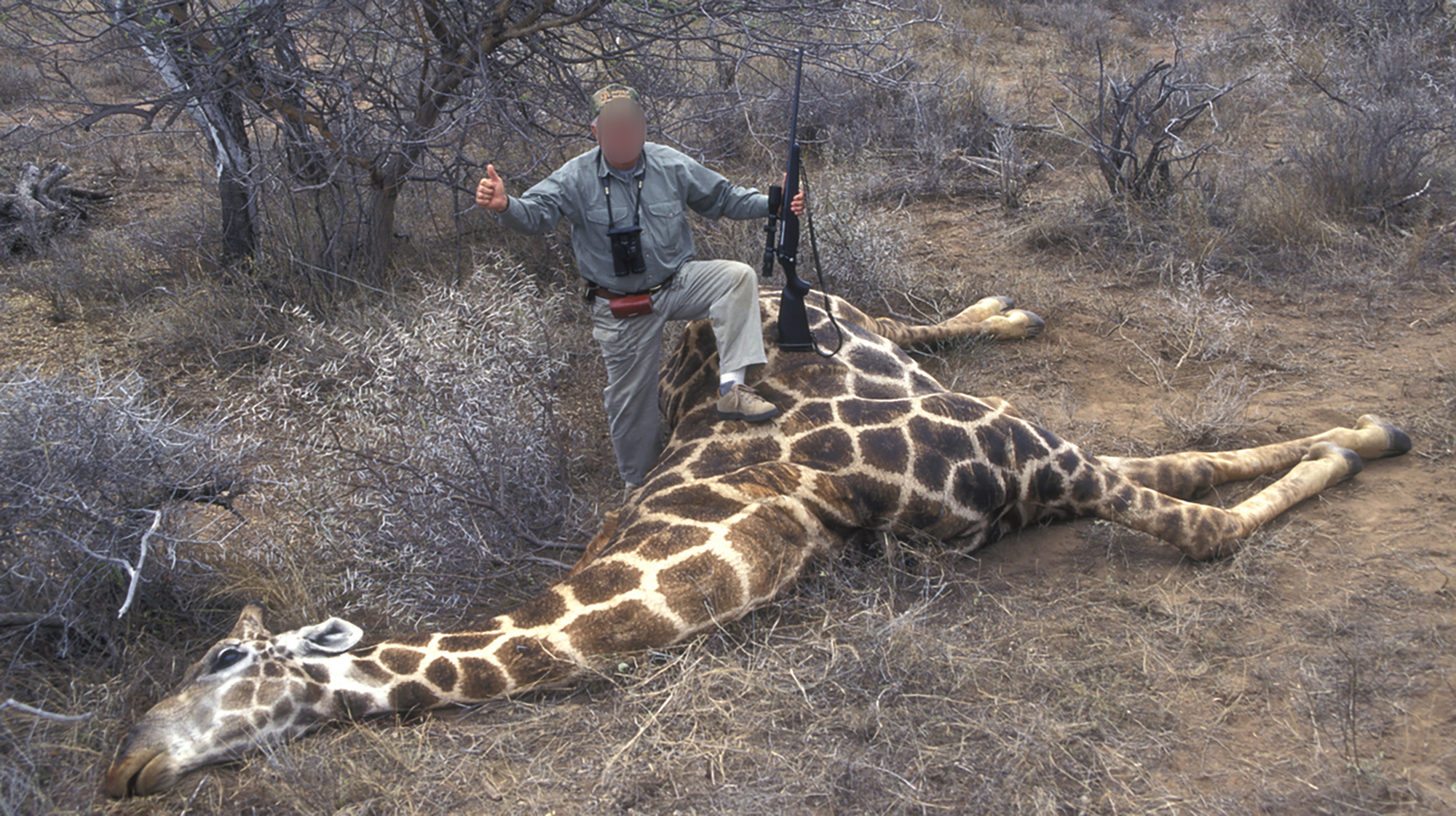
A hunter with his kill. (Photo: HSI / Africa)
“In South Africa, hunted animals are bred, bought, sold, transported and otherwise processed and ultimately delivered to a property where a trophy hunter can kill them, and where the kill is often guaranteed. It is all about the money that can be made by industrialising, managing and manipulating wildlife for economic gain.
“This has significant negative impacts on animal welfare, provides opportunities for illegal wildlife trade and seriously undermines claims that trophy hunting contributes to conservation.”
Although largely statistical, the report also noted some hunting methods suggested by hunt outfitters:
- “Baboons are similar to a human in physiology, so a chest shot will suffice.”
- “If you aren’t hunting aardwolf in Africa, but the opportunity to take one comes while on a different hunt, then whatever rifle you have at the moment will do the job. Try to place the bullet just behind the shoulder, about one-third of the way up the body.”
- “Hunting blue duiker is most likely best done using a shotgun. Classic shot placement of course would be on or just behind the shoulder. However, when hunting blue duiker, one may have to settle for a hit wherever it can be made.”
- “Hunting serval with dogs is usually conducted in the mornings. After lunch you can nap and then go out after dark, spotlighting.”
- “This outfitter utilises a live camera system that allows the honey badger bait sites to be monitored 24 hours a day from the hunting lodge. You can actually watch the bait sites while you are eating or relaxing at the lodge!”
- “African wildcat hunting mainly takes place during a hunt for other animals. Should the African wildcat be facing away, then what’s commonly called ‘The Texas Brain Shot’ — aiming at the base of the tail where it joins the body — will put it down.”
- “When hit well, the vervet monkey won’t go very far. They leave a poor blood trail because they bleed out rapidly. Unless the monkey goes down and stays down, wait about 15 minutes before doing a follow-up.”
An economic review of eight countries in Africa, including South Africa, demonstrated that the total economic contribution of trophy hunters was a mere 0.03% of the gross domestic product in those eight countries.
Conservation experts and professionals say that trophy hunting “yields low returns at household levels with only a fraction of generated income reaching local communities”.
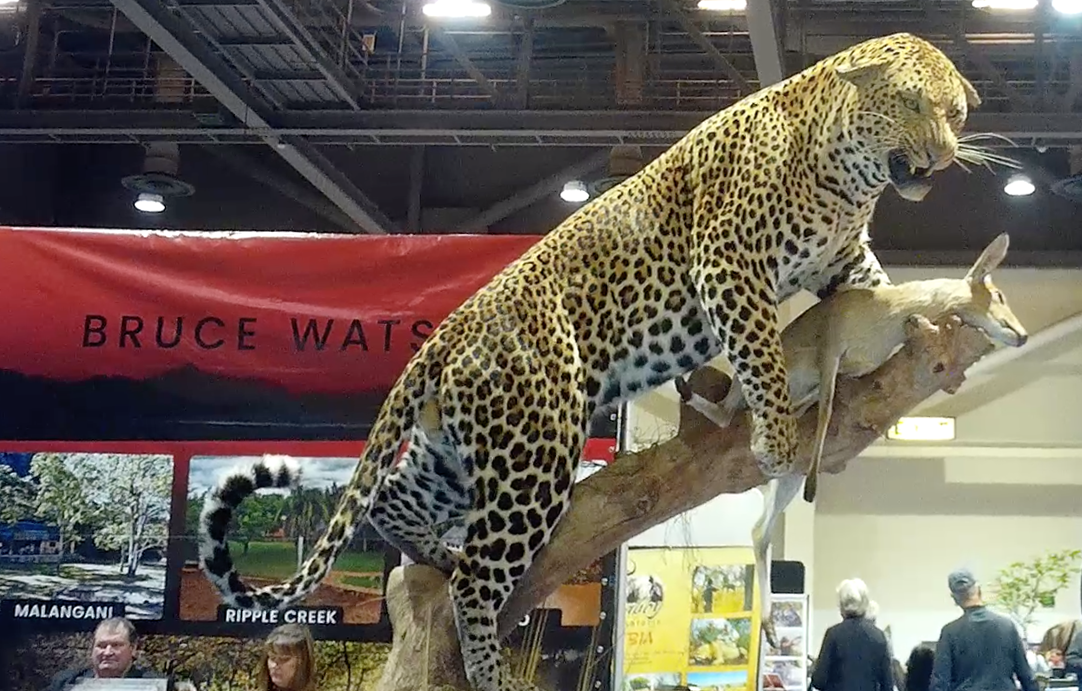
Leopard taxidermy at the annual SCI convention in 2020. (Photo: HSI / Africa)
“We are terribly disappointed that the DFFE [Department of Fisheries, Forestry and the Environment] is failing in its duty to protect our threatened and endangered wildlife species,” says Dr Audrey Delsink, wildlife director for HSI/Africa.
“It’s unacceptable that we allow people to hunt endangered and critically endangered animals for the purpose of collecting their remains as trophies.
“The claim that trophy hunting contributes to conservation cannot be justified in light of the evidence demonstrating that one third of South Africa’s hunting trophies are captive-bred animals and many are non-native or species not subject to science-based population management.
“The captive breeding and intensive farming of wild animals in South Africa for profit often harms conservation efforts, with negative impacts on biodiversity when protected landscapes are carved up into breeding camps and predators are targeted as competition.
“Killing animals for ‘fun’ is part of the archaic ‘if it pays it stays’ concept that demands immediate change. Killing animals for pleasure has no place in conservation.” DM/OBP




















 Become an Insider
Become an Insider
Why blur their photos?
The three fat guys that killed the lion could not chase DM around a city block and the guy that hunted a giraffe should surely be proud of his amazing skill…
I get sustainable hunting but trophy hunting belongs in a museum.
Barbaric.
It’s not hunting. It’s animal murder. The coward with the dead zebra has cows grazing in the background in the same field. How can this be called ‘hunting’? Expose the faces.
Imagine want to kill and stuff an animal instead of reveling in it being alive. What is wrong with people
Whoever wrote the ‘hunting methods suggested by hunt outfitters’ is really sick in the head. Whoever it is, or whoever they are, need to be outed. Must be very small to need to kill in this manner this to feel big.
Good article Don. By the way, the Barbary Sheep is also exotic.
The one issue which needs to be carefully considered in the debate around hunting, is the question of habitat protection, which results in conservation of literally thousands of non-exploitable species. This is the main conservation argument for sustainable hunting (which does NOT include hunting of endangered species) which I believe should be tolerated/encouraged on game farms where it contributes to the farm economy. I also believe that wildlife provides a potentially sustainable source of protein, as opposed to unsustainable poaching. The debate is complex and nuanced, but the nuances are almost always overlooked, by both sides of this highly charged issue.
All the wild animals in private lands should be released in put into national parks where the government can keep them safe from poachers, including the Rhinos that are so well protected in the Kruger. That way all hunting will stopped
Transferring privately owned animals to national parks is a 100% sure way of getting rid of all wildlife. The government is totally unable to “keep them safe from poachers”.
“Rhinos that are so well protected in the Kruger” Wow! What a dumb statement! Please read the many reports of the poaching of rhinos in the Kruger being much heavier than privately owned rhinos!!!!
Hunting using ethical methods, very much supports conservation which should not be confused with preservation. Vast areas of land have been converted from environmentally destructive cattle farms to far more biodiverse game farms, motivated by the gains from hunting. Stop these gains and other environmentally less desirable land-uses will return. Killing an animal is not the issue and should not be the deciding factor. We do that in the millions every day (check with the chickens). Doing so in a responsible and respectful manner is the issue – assuming these adverbs can be logically associated with the act of killing. However, ask the many communities and indigenous people that do so on a daily basis.
Actually, killing animals is an ethical issue. After all, humans are animals and it is considered unethical to take another human’s life. Any attempt to undervalue the lives of other animals is ethically suspect, for instance, the assumption that animals are mere means to human ends or the ideology of human exceptionalism. An instrumentalist attitude to animals is one of the problems of framing the debate in economical rather than ethical terms. In fact, hunting is not necessary for conservation as witnessed by the National Parks.
We can flourish on a plant-based diet without killing animals, and the positive environmental consequences are enormous. The assumption that we need to consume animal protein is simply mistaken. So is the assumption that we can provide meat for billions of humans through hunting. We will have to adopt a plant-based diet if we are to continue to live on this planet. Hunting remains a sport for the wealthy or a means of subsistence for marginalised rural communities. Hunters are correct to criticise industrial animal-based agriculture, as farmed animals consume a large proportion of crops and produce huge amounts of waste and pollution, including a large proportion of greenhouse gases. However, hunting does not offer a plausible alternative. A plant-based diet will ensure a much more efficient use of land for food production and free up much more land for reserves.
“We can flourish on a plant-based diet” Evidence suggests otherwise, but even if we could, do you think that it would be possible to convert even a small number of the world’s billions to veganism? A moment’s reflection will show that this is not going to happen, which negates the whole thrust of this argument.
Hunting is here to stay and it benefits conservation. Don Pinnock’s shock/horror revelation that the department had issued licenses for ” 10 critically endangered black rhino ” fails to mention that these were post-reproductive individuals. Don never mentions any facts that get in the way of his prejudices.
Ian Hurst fails to engage with my arguments except on the most superficial level.
Firstly, the fact is that millions of people are moving to a plant-based diet and are living, on average, a more healthy life than those who do not. Diet science has progressed very far since the days that a plant-based diet was considered insufficient. Besides, there are millions of people, particularly Hindus, Jains and Buddhists, who have not eaten animal bodies for thousands of years. The meat-centred Western diet is a serious threat to the health of the planet. Hurst fails to acknowledge the truth that hunters cannot provide meat for billions of people on anything like the scale of the environmentally destructive industrial animal farms.
However, the truth is that the hunting industry, especially trophy hunting, is not about conservation (that is just a rationalisation or smoke-screen). It is primarily about profiting from the exploitation of particular species of wild animals. It is largely a right-wing affair and a primary instance of toxic masculinity (despite the fact that some women might buy into it).
Hurst claims to have refuted the main thrust of my argument (which he failed to do). However, he completely fails to engage with the ethical side of my argument. His comment about the black rhinos show the degree of his failure to understand the ethical implications of hunting, as he shows a purely instrumentalist and commercialised perspective. The hunting industry is rather sordid.
Oh Dear! So many wild, unsubstantiated assertions!
“millions of people are moving to a plant-based diet” Evidence please!
“largely a right-wing affair” Evidence please, but even if it is a right wing affair, does that make it wrong?
“humans are animals and it is considered unethical to take another human’s life” so does a rat have the same value as a human?
“hunting is not necessary for conservation as witnessed by the National Parks” Poaching is more prevalent in the National Parks than in Private Parks, and hunting supports many Private Parks.
“Hunting remains a sport for the wealthy” Perhaps, but does that make it wrong?
“hunting does not offer a plausible alternative (to agriculture)” Very few people would claim that it does.
“fails to engage with the ethical side” Ethics are very difficult to argue, so I did not comment on Mr. Northover’s ethics, just his logic.
“main thrust of my argument” The main thrust is that if we all convert to a plant based diet, the world will be a better place. My argument is that whether this is true or not, it is irrelevant. There are SEVEN THOUSAND NINE HUNDRED AND FORTY MILLION people in this world. At best Mr. Northover’s “millions” of plant eaters are going to be a minute, ignorable, fraction of the world’s population. Therefore his argument is without practical merit.
In fact, I can substantiate my claims and you could check them yourself. The Wikipedia “Vegetarianism by country” entry’s survey of 43 countries indicates about 480,000,000 vegetarians, which is not “a minute, ignorable, fraction of the world’s population”. The truth is that a meat-centred diet is environmentally unsustainable and a major producer of greenhouse gases and, therefore, a major driver of climate change. This is made very clear in the United Nations Food and Agriculture Report (2006) and subsequent reports paint an even bleaker picture. If most people do not adopt a plant-based diet, the environmental consequences will be dire, and the continued existence of humans on the planet may be in jeopardy. So, it is a serious issue and many people and institutions are beginning to understand this and act accordingly. I can list many, many credible sources to substantiate my views, but this reply page is too limited in space to be filled up with references. Nonetheless, for the right-wing connection to hunting please see Michelle Pickover’s Animal Rights in South Africa (2005). For the unsustainability of the meat industry and the inequalities of the food system see Frances Moore Lappe’s Diet for a Small Planet (1991). As for animal ethics, the literature is vast, but I provide a basic outline in the first Chapter of my PhD thesis entitled “J.M. Coetzee and Animal Rights: Elizabeth Costello’s Challenge to Philosophy”. You can download it from UP’s institutional repository.
Indeed, and unfortunately, hunting is here to stay just as there will always be psychopaths and serial killers in our midst.